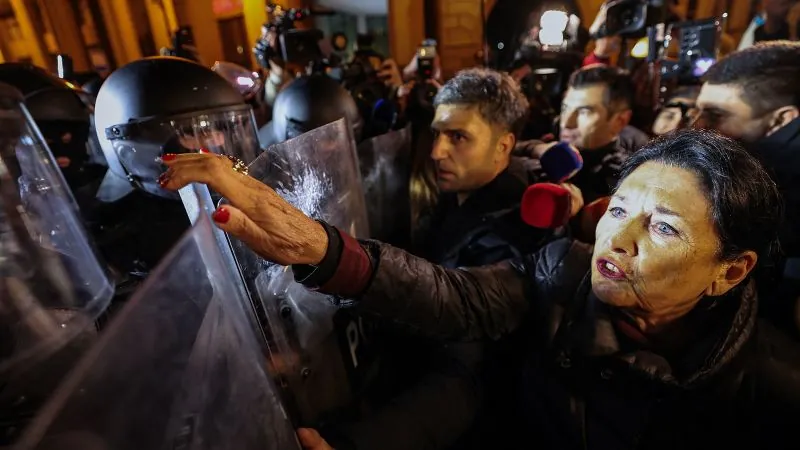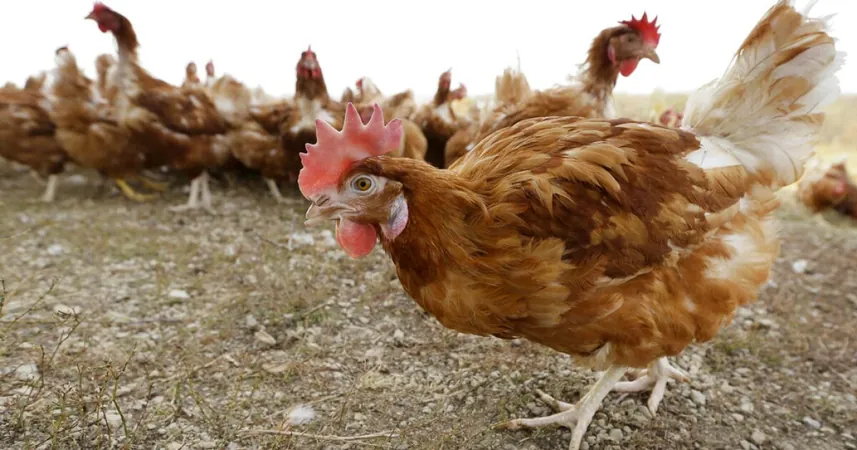
Tensions Rise in Georgia as Protesters Clash with Police over EU Membership Talks Suspension
2024-11-29
Author: Jessica Wong
Overview
In a dramatic escalation in Georgia's political landscape, clashes erupted between protesters and police in the capital city of Tbilisi early Friday morning. The unrest was sparked by the ruling party's announcement to suspend talks on joining the European Union and to refuse any budgetary grants until 2028.
Clashes and Injuries
The Interior Ministry of Georgia reported that three police officers sustained injuries during the confrontations. Protesters, many of whom were masked, attempted to breach the parliamentary gates, leading police to deploy water cannons, pepper spray, and tear gas in an attempt to disperse the crowd. Tensions flared as demonstrators hurled fireworks and shouted accusatory slogans such as "Russians" and "Slaves!" directed at the authorities.
Deteriorating EU Relations
Relations between Georgia and the EU have soured significantly in recent months, with Brussels criticizing the Georgian government for adopting increasingly authoritarian tactics and leaning towards pro-Russian policies. As a result, thousands of pro-EU supporters had already taken to the streets, blocking key roadways before the violence ensued.
Government Reaction
The ruling Georgian Dream party accused the EU of a "cascade of insults" and claimed that the bloc was using accession talks as a means to "blackmail" the nation and instigate a revolution. The party's statement was clear: "We have decided not to put the issue of opening negotiations with the European Union on the agenda until the end of 2028. Additionally, we refuse any financial support from the EU during this period."
Public Sentiment and Opposition
Public sentiment remains largely in favor of EU membership, as opinion polls indicate that around 80% of Georgians support the idea. The opposition parties have reacted vehemently against the ruling government's announcement, mobilizing protests across the country. Giorgi Vashadze, a leading opposition figure, condemned the ruling party's decisions as a betrayal of Georgian sovereignty and people's trust.
Political Tensions
President Zourabichvili voiced concerns about the government's actions, stating that they have declared "war against their own people," pointing toward a potentially volatile future as her term approaches its end in December.
Electoral Integrity
Adding fuel to the fire, recent electoral outcomes have led the opposition to accuse the Georgian Dream government of fraud—claiming that the election results were manipulated in favor of the ruling party, which secured nearly 54% of the vote.
Economic Concerns
Prime Minister Irakli Kobakhidze has also addressed concerns surrounding EU membership, claiming that it could jeopardize Georgia's economy by limiting trade agreements and visa-free travel with other nations.
Historical Context
The situation is made more complex by the historical backdrop of Georgia's relationship with Russia, following a brief war in 2008 that severed formal diplomatic ties.
Conclusion
As tensions mount, many observers wonder what the future holds for Georgia's pro-Western aspirations amidst internal strife and geopolitical pressures.



 Brasil (PT)
Brasil (PT)
 Canada (EN)
Canada (EN)
 Chile (ES)
Chile (ES)
 España (ES)
España (ES)
 France (FR)
France (FR)
 Hong Kong (EN)
Hong Kong (EN)
 Italia (IT)
Italia (IT)
 日本 (JA)
日本 (JA)
 Magyarország (HU)
Magyarország (HU)
 Norge (NO)
Norge (NO)
 Polska (PL)
Polska (PL)
 Schweiz (DE)
Schweiz (DE)
 Singapore (EN)
Singapore (EN)
 Sverige (SV)
Sverige (SV)
 Suomi (FI)
Suomi (FI)
 Türkiye (TR)
Türkiye (TR)